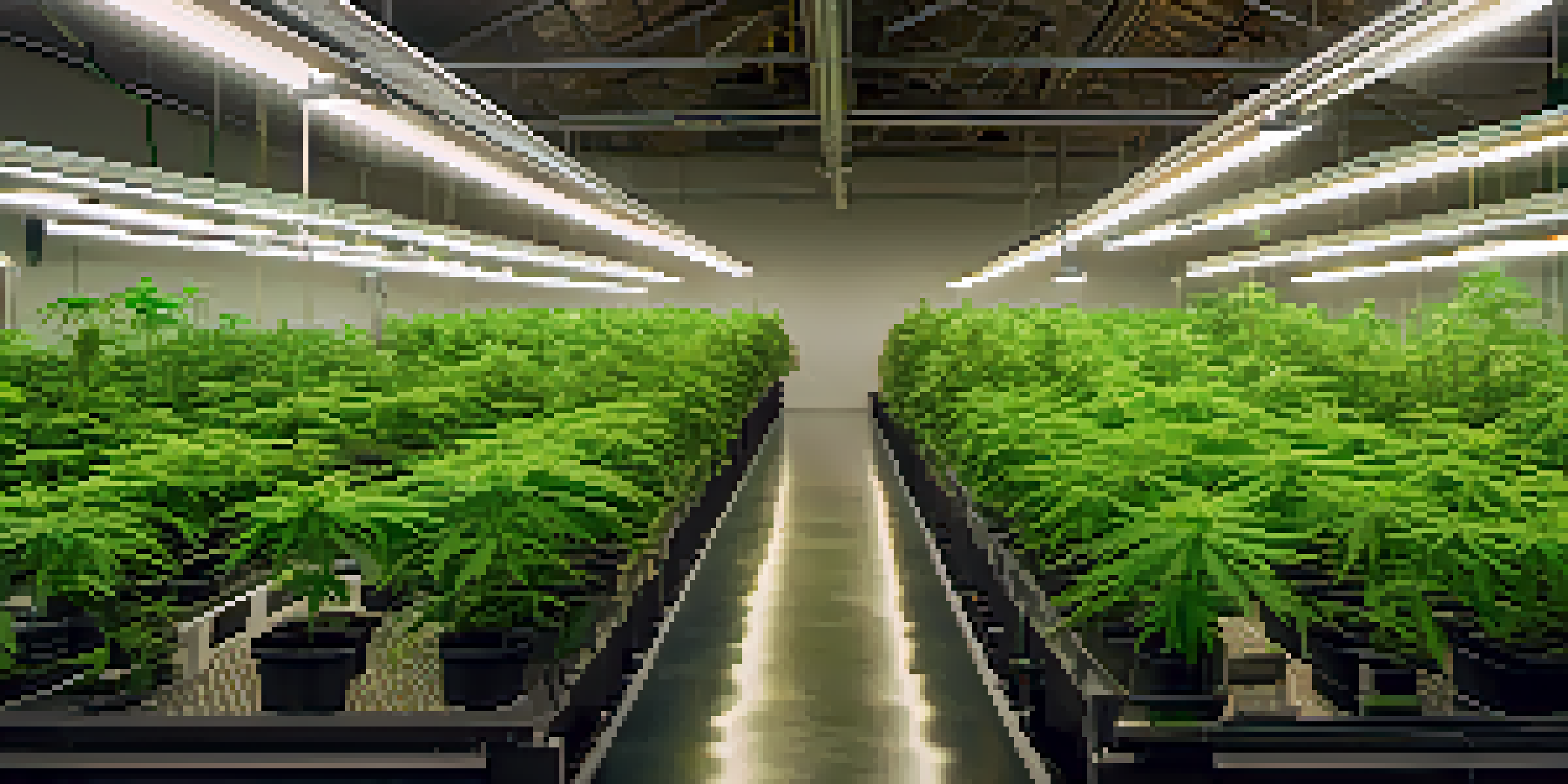Marijuana Impact on Job Creation and Economic Development

The Growing Marijuana Industry: A Job Creation Powerhouse
The legalization of marijuana has sparked a booming industry that is creating jobs at an unprecedented rate. From cultivation to retail, the spectrum of opportunities is vast, with roles ranging from agricultural workers to dispensary staff. States that have embraced legalization have seen significant employment increases in these sectors, contributing to local economies.
The legalization of marijuana has the potential to create jobs and stimulate economic growth in communities that need it most.
For instance, Colorado, one of the first states to legalize recreational marijuana, has reported tens of thousands of new jobs since 2014. This boom is not just limited to direct employment; it also creates ancillary jobs in areas like marketing, security, and logistics, showcasing the industry's ripple effect on the economy.
Moreover, as more states consider legalization, the potential for job creation expands even further. This trend indicates that the marijuana industry could play a vital role in reducing unemployment rates, especially in regions with few job opportunities.
Economic Development: Boosting Local and State Revenues
Legalizing marijuana has proven to be a lucrative venture for local and state governments. By taxing marijuana sales, states have generated substantial revenues that can be reinvested into schools, healthcare, and infrastructure. These funds are crucial for enhancing the quality of life in communities that may struggle with financial resources.

Take California, for example; the state collected over a billion dollars in cannabis tax revenue in 2021 alone. This influx of money not only supports public services but also helps to alleviate budget deficits and fund vital programs that benefit residents.
Job Creation in Legal Marijuana
The legalization of marijuana has led to significant job creation across various sectors, from cultivation to retail.
Additionally, as the marijuana industry continues to grow, so does the potential for economic development in surrounding areas. Increased tax revenues can lead to improved public amenities and services, creating a more attractive environment for businesses and residents alike.
Challenges and Barriers: Navigating a Complex Landscape
Despite the potential benefits, the marijuana industry faces significant challenges that can hinder job creation and economic growth. Regulatory hurdles, such as varying state laws and federal restrictions, complicate the landscape for businesses trying to thrive. This inconsistency can create uncertainty for investors and entrepreneurs.
A legal cannabis industry can help to address social inequities, providing opportunities for those who have been historically marginalized.
Additionally, the stigma surrounding marijuana use can impact public perception and acceptance of the industry. Some communities remain resistant to legalization, which can slow down economic development efforts and limit job opportunities in those areas.
Moreover, businesses often struggle to access traditional banking services due to federal regulations. This lack of financial support can stifle growth and innovation, preventing the industry from reaching its full potential in contributing to job creation and economic advancement.
Job Diversity: From Cultivation to Corporate Management
One of the most exciting aspects of the marijuana industry is the diversity of jobs it offers. From hands-on roles in cultivation to corporate positions in marketing and finance, the industry caters to a wide range of skills and expertise. This variety not only attracts a diverse workforce but also empowers individuals to find their niche within the sector.
For example, a person passionate about horticulture can work directly in growing cannabis plants, while someone with a background in finance may find a fulfilling career managing a marijuana business's finances. This unique blend of job opportunities makes the industry appealing to a broad audience, including those seeking career changes.
Economic Growth Through Tax Revenue
Legal marijuana sales generate substantial tax revenues that can be reinvested in critical community services and infrastructure.
Furthermore, as the industry evolves, new roles are continually emerging. Positions focused on research, compliance, and education about responsible use are becoming increasingly important, showcasing the industry's potential for ongoing job creation.
Community Impact: Local Economies Thriving
The emergence of the marijuana industry has a profound impact on local communities, often revitalizing areas that have faced economic downturns. As dispensaries and cultivation sites open, they bring foot traffic, create demand for local services, and boost the economy. This influx can breathe new life into struggling neighborhoods, fostering a sense of community and pride.
Moreover, many marijuana businesses prioritize community engagement and support local initiatives. Whether it’s sponsoring local events or partnering with community organizations, these businesses often aim to give back, further enhancing their positive impact.
As a result, the presence of a thriving marijuana industry can lead to increased property values and a lower crime rate, transforming communities for the better. The symbiotic relationship between marijuana businesses and local economies illustrates the power of this industry in fostering sustainable growth.
Future Prospects: The Evolving Landscape of Employment
As more states consider legalizing marijuana, the future of job creation in this industry looks promising. With evolving regulations and a growing acceptance of cannabis, businesses are likely to flourish, leading to increased employment opportunities. This shift could have a lasting impact on the overall economy, changing the way people view and interact with the industry.
Moreover, the global market for marijuana is expanding, with many countries exploring legalization. This presents a unique opportunity for American businesses to lead in innovation and best practices, potentially exporting expertise and products to international markets.
Focus on Social Equity Initiatives
The marijuana industry is increasingly incorporating social equity programs to address historical inequities and promote diversity in the workforce.
The potential for job creation in the marijuana sector is not just limited to cultivation and retail; it can also drive advancements in research and development, technology, and sustainability practices. As the industry matures, it will likely continue to evolve, offering exciting career paths and contributing to economic growth.
Social Equity: Addressing Inequities in the Workforce
The marijuana industry has the potential to address historical inequities in employment and economic opportunities. Many states are incorporating social equity programs into their legalization frameworks, aiming to support individuals from communities disproportionately impacted by previous drug laws. This initiative creates pathways for those who may have faced barriers to entry in the job market.
By prioritizing diversity and inclusion, the industry can help create a workforce that better reflects the communities it serves. This not only fosters a sense of belonging but also drives innovation and creativity within the sector.

Furthermore, successful social equity programs can serve as a model for other industries seeking to promote diversity and rectify past injustices. As the marijuana industry grows, its commitment to social equity can pave the way for a more inclusive economic landscape.